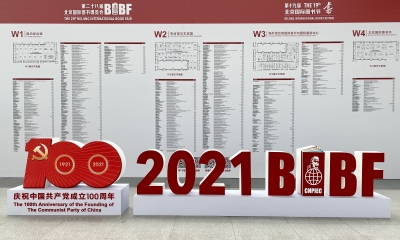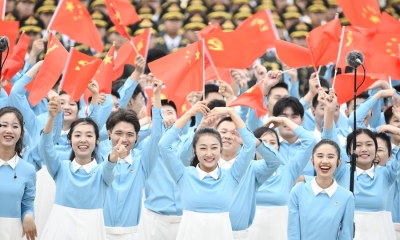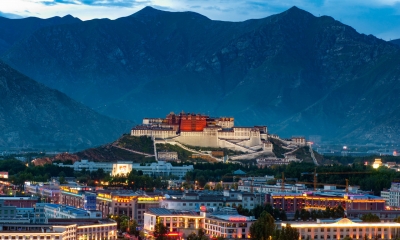The Consequences of Washington’s Hong Kong Bill

Hong Kong’s so-called “autonomy” will now be judged by how closely the financial hub abides by and enforces Washington prescribed trade policies.
Following President Trump’s passage of the controversial Hong Kong Human Rights and Democracy Act (the bill) into law, a group of Hong Kong activists gathered in the city’s central district to celebrate the news. Images of a jubilant Hong Kong crowd celebrating the bills ascent were beamed into the homes of festive audiences across the U.S. enjoying Thanksgiving.
The images of the peoples of Hong Kong proudly waving the Star-Spangled Banner offered a rare opportunity for the American people to overlook their domestic differences and come together.
Much of the American public hailed the passage of the bill given that it was touted as a new weapon in Washington’s legislative arsenal in their noble quest to save the people of Hong Kong against an encroaching and menacing China.
However, on closer inspection, the Hong Kong Human Rights and Democracy Act offers very little cause for celebration and much more cause for concern.
The Bill
The most worrying aspect of the bill is that it grants Washington the power to strip Hong Kong of its unique freeport status – along with the territory’s preferential trading terms – should its autonomy from China be judged not sufficient enough.
But what is the yardstick with which Washington will measure Hong Kong’s levels of autonomy you ask?
Section 5 point 4 gives a clear answer to this question. “An assessment of the policies and actions of the Government of the Hong Kong Special Autonomous Region to enforce sanctions imposed by the United States and the United Nations.” Effectively, Hong Kong’s so-called “autonomy” will now be judged by how closely the financial hub abides by and enforces Washington prescribed trade policies.
John McGuire – a British expat who works in Hong Kong’s finance sector – warns that the bill effectively removes Hong Kong’s “ability to trade as an independent financial center”.
Given that the bill forces Hong Kong to abide by the “sanctions and export policies” of a foreign actor – the bill should be viewed as what it is – a clear infringement of Hong Kong’s autonomy by the United States. The fact that Hong Kong’s loss of sovereignty is occurring under the guise of protecting the territory’s autonomy adds insult to injury.
Ng Chau-pei, president of the Hong Kong Federation of Trade Unions condemned the U.S. for passing the bill, describing the move as “pure gangsterism”. Whilst, professor Lau Siu-kai of the Chinese University of Hong Kong, observes that the U.S. is openly challenging China’s sovereignty.
Tom Fowdy – an expert in international relations – is in agreement with both sentiments. He notes that the bill “involves effectively exporting America’s trade and technology wars into China’s territory” in an attempt to “leverage the city into something that is permanently differentiated and thus antagonistic to the Chinese mainland and its national interests.”
China’s Foreign Ministry described Washington’s move “nakedly hegemonic” and quickly enforced retaliatory countermeasures against the U.S.. In response to the bill, Beijing has banned US Navy vessels from visiting Hong Kong and sanctioned American NGOs for inciting protesters to commit “violent crimes” and promoting “separatism” in Hong Kong.
Washington largely expected a counter response From China given the repeated warnings issued by Beijing of a ‘forceful’ response should the Hong Kong act become law. However, with the bill being fast-tracked through the House and the Senate and receiving very little scrutiny by the media, there are many other consequences which many in the U.S. have not considered and should provide cause for concern.
Unintended consequences
Hong Kong – recognized as the world’s freest economy for the past twenty-two years – has gained a reputation in the international business community as a stable base for Asia operations and also a gate-way to the world’s second largest economy. Accordingly, Hong Kong is a central pillar in the interconnected world of global capitalism and any shocks experienced in its economy will likely reverberate far beyond its borders.
The United States is just one of many countries which has significant and deeply entrenched business interests in Hong Kong. According to the US State Department, more than 1,300 American businesses operate in Hong Kong, of which 300 base their Asia region operations there.
The American Chamber of Commerce in Hong Kong warned of possible consequences as the bill passed through US Senate. “AmCham has reservations about certain provisions of the [bill] that we fear could have unintended, counter-productive consequences, including on American businesses,” a statement read.
Given Hong Kong’s renowned status as a strategic territory for global capital, coupled with the interconnected nature of the global economy – what effect will the bill have on the wider global economy?
Global recession
It would of course be reckless for anybody to suggest that an economy the size of Hong Kong’s – even one as deeply embedded in the globalized world of today – could alone cause a global recession. That claim is certainly not being made here. But, is it unreasonable to suggest that the escalating and aggravating factors in Hong Kong could act as the straw that breaks the metaphorical camel’s back?
This year, the International Monetary Fund has forecast global GDP growth at just 3 percent – notably the slowest growth since the financial crash.
Additionally, in August of this year –a key predictor of future economic activity – the yield curve – inverted for the first time since the 2008 crisis. The news of this development sent shockwaves around the world given that the last seven times the index has inverted; a recession has followed within 24 months.
With bleak economic activity this year, and the even more disturbing future growth forecasts, Moody’s has announced that a global recession within the next 12-18 months has a 50 percent probability. Notably, this announcement was made before Hong Kong’s economy dropped into recession in the fourth quarter of this year.
Hong Kong’s leader Carrie Lam – with the Hong Kong and wider global economy in mind – warned that as a result of the new legislation, business will likely suffer further as companies “will be worried the actions the U.S. government will take in the future.”
Of course, the exact consequences of the Hong Kong Human Rights and Democracy Act are impossible to predict. It is however, safe to assume that the bill – particularly in the environment of rising protectionism, the U.S.-China Trade War, and Brexit – will contribute to the growing climate of uncertainty plaguing the global economy.
 Facebook
Facebook
 Twitter
Twitter
 Linkedin
Linkedin
 Google +
Google +







